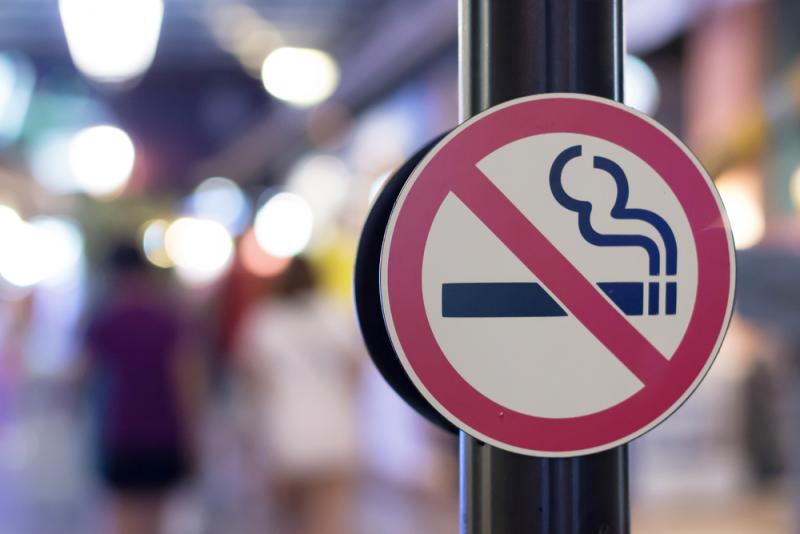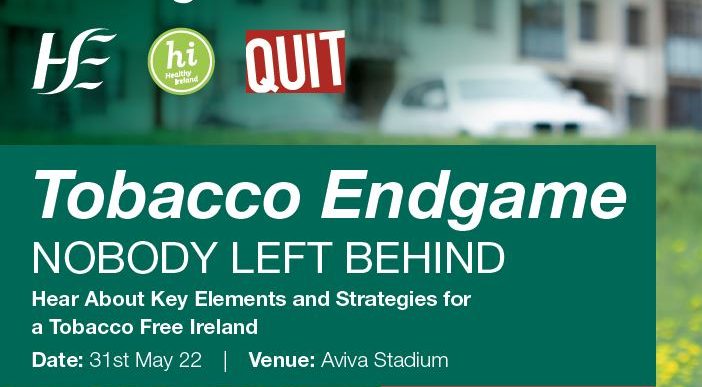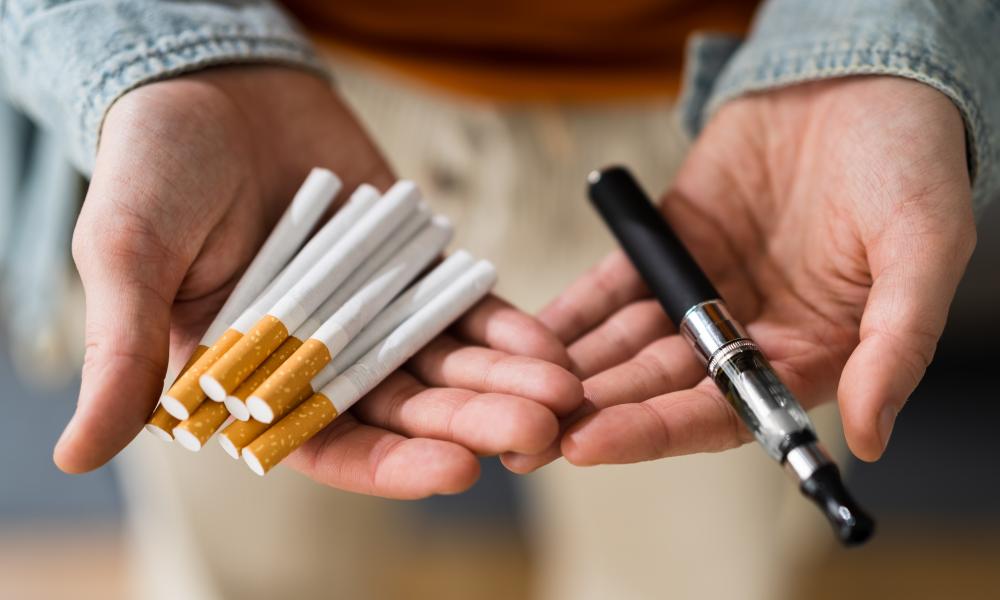
In recent weeks, IPH participated in a ‘Tobacco Endgame: Nobody Left Behind’ conference, hosted by the HSE, to mark World No Tobacco Day on 31 May. In this blog, Lauren Rodriguez, IPH Public Health Development Officer, shares an overview of the evidence presented at this conference, which focussed on Ireland’s ambitions to reach a tobacco endgame.
On 31 May, the HSE ‘Tobacco Endgame: Nobody Left Behind’ conference gathered health service practitioners, researchers, advocates, policy makers and young people together to discuss trends in evidence and future ambitions for tackling tobacco control in Ireland.
The conference was opened by the Taoiseach, Micheál Martin, who reaffirmed the government’s commitment to a Tobacco Free Ireland (TFI). Published in 2013, the TFI goal aims to achieve a 5% tobacco consumption rate by 2025. While we have a long way to go to meet this TFI target – smoking prevalence rates currently stand at around 18% – the conference event reaffirmed the need to remain ambitious and committed at policy level given Ireland’s history and leadership in tobacco control.

Current State of Play
The conference heard from Dr Paul Kavanagh, consultant in public health medicine for the HSE Tobacco Free Ireland programme, who discussed recent trends published in the latest TFI report, State of Tobacco Control in Ireland 2022.
This report examined survey data across the population using Healthy Ireland annual surveys from 2015- 2021. The analysis revealed that the burden of tobacco harm is concentrated in deprived communities and that this unequal burden is increasing.
Key findings from the State of Tobacco Control 2022 report included:
- Overall, the proportion of people who currently smoke fell from 23% in 2015 to 18% in 2021.
- People who smoke were almost two times more likely to report poor health and long-standing illness.
- The socioeconomic gradient in smoking widened between 2015 to 2021. The latest data shows that 11% of those from the most affluent areas reported being a current smoker as compared to 31% of those living in deprived areas.
- The age profile of people who smoke is shifting. Compared to 2015, smoking was concentrated among middle age groups in 2021, particularly among 45–54-year-olds.
- A decline was observed in smoking prevalence among younger age groups (15–34-year-olds). However, emerging and complex behaviours in tobacco product consumption warrant close attention and data monitoring.
- ‘Roll your own’ tobacco use increased steadily over the last ten years and a higher proportion of people who smoke reported using these products in 2021 compared to data from 2013. Large increases were observed among females and those aged 25-34 years and aged 55-64 years.
- Across population groups, use of e-cigarettes is higher among younger people and those in lower socio-economic groups, and increasing in these groups. For example, among 15-24 year-olds, e-cigarette use increased from 1% to 4% between 2015 and 2021.
- A social class gradient was also observed among those who want to quit. From 2015, there was a significant reduction in positive intention to quit among those from routine/manual occupational backgrounds compared to those from managerial/ professional backgrounds.
As evidenced in the State of Tobacco Control in Ireland 2022 report, there is an urgent need to address inequalities in tobacco consumption and smoking cessation. This data is also contextualised by stark inequalities in population life expectancy. Compared to men living in the most affluent areas, men in the most deprived areas die on average 5 years earlier. A similar disparity is observed among women. Women living in the most deprived areas die 4.5 years earlier than their peers in more affluent areas. This gap in life expectancy is unfair and requires a health in all policies approach to achieve health equity.
Ending the Tobacco Epidemic
Given the scale by which tobacco consumption negatively impacts Irish society and the Exchequer, the HSE commissioned a survey to measure public opinion for a tobacco endgame.
At the conference, Dr Ellen Cosgrave presented findings from the Bringing the Tobacco Epidemic to an End report, which found that the majority of the general public feel that more ambitious action is needed to reduce tobacco harm.

The public opinion survey also demonstrated that four out of five respondents believed that:
- Tobacco product sales should be phased out of the market completely
- Shops that sell tobacco products should be required to display information to encourage tobacco users to quit
- The nicotine content in cigarettes and e-cigarettes should be reduced to make them less addictive
- Tobacco products should be more tightly regulated
- Tobacco companies should be required to contribute to the health costs associated with tobacco use and harm
- Tobacco product sales should be banned near playgroups, schools and university campuses.
This evidence is important for demonstrating support for tobacco control initiatives and harnessing public and political will for tobacco control at policy level.
Policy and Evidence
IPH policy team members also participated in the recent ‘Tobacco Endgame: Nobody Left Behind’ conference.
IPH Public Health Development Officer Dr Ciara Reynolds presented some preliminary findings from a comprehensive evaluation of the HSE Tobacco Free Ireland Programme. The project is evaluating the provision of stop smoking services through an equity framework to address gaps and reduce health inequalities. The project is focused on three key areas of analysis including, evidence review, stakeholder engagement, and quantitative data analysis. A survey of HSE staff was also commissioned, as well as interviews with statutory stop smoking services internationally to inform the strategic planning of the HSE stop-smoking service.
IPH Director of Policy Dr Helen McAvoy and Chair of the Royal College of Physicians of Ireland (RCPI) Tobacco Policy Group Dr Des Cox also presented evidence for raising the minimum legal age of sale for tobacco products to 21 years. This presentation followed on from evidence given to the Joint Oireachtas Committee for Health in March on the Public Health (Tobacco and Nicotine Inhaling Products Bill).

The impacts of COVID-19 coupled with the tobacco epidemic have exacerbated fault lines in health inequities around the world. In Ireland, this burden of the two epidemics has been experienced among the more socially vulnerable in the population. As highlighted in the recent Khan Review: Making Smoking Obsolete published in England, more ambitious tobacco control measures will be required to achieve health equity.
Further information and support
For more information about the recent HSE conference visit https://www.hse.ie/eng/about/who/tobaccocontrol/news/
See also this series of Tobacco MythBusters developed by IPH for World No Tobacco Day this year to debunk some of the myths that persist around tobacco.
For more information about stop smoking clinics run by the HSE see https://www2.hse.ie/quit-smoking/support-services/
Peer-to-peer support is also available on the QUIT Facebook Page or on Twitter @HSEQuitTeam.
References
Health Service Executive. Bringing the Tobacco Epidemic to an End: Public Views on “Tobacco Endgame” in Ireland; 2022.
Health Service Executive. The State of Tobacco Control in Ireland: HSE TFI programme; 2022.
Khan J. The Khan review: making smoking obsolete. Office for Health Improvements and Disparities; 2022.


